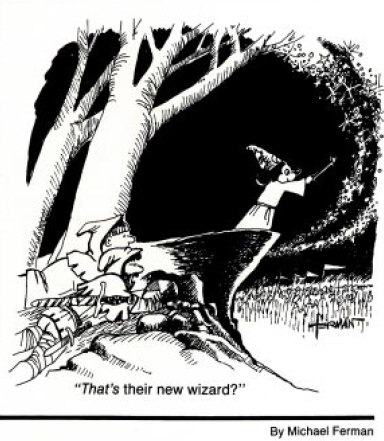*template**template*
Cantrips

Cantrips are the magic spells
learned and used by apprentice magic-users
and illusionists
during their long, rigorous, and tedious training
for the craft of magic-use.
An aspiring magic-user or illusionist may
use 1 cantrip per day as
a 0-level neophyte (-2000 x.p. to -1 001 x.P.),
2 cantrips per day as a
0-level initiate (-1000 to -501), and 3 cantrips per
day as a 0-level apprentice
(-500 to -1). Cantrips must be memorized
just as higher-level spells
are.
Most cantrips are simple
little spells of no great effect, so when the individual
becomes a Prestidigitator
(MU1), the knowledge and info
pertaining to these small
magics are discarded in favor of the
more powerful spells then
available. However, a magic-user may opt
to retain up to four cantrips
in place of one 1st-level spell. This assumes
that the magic-user has,
in fact, retained his or her book of
cantrips -- a tome as large
as a good-sized book of higher-level
spells.
All cantrips are 0 level,
have a 1 “ range, have a generally small AREA
of effect, require only
soft, simple verbal and somatic components,
and are cast in a very short
time (1/10 to 1/2 segment). Only those which
involve living creatures
afford any saving throw. Individuals in a state
of extreme concentration
(such as when casting a spell) do not have
that concentration broken
by person-affecting cantrips. The effects of
cantrips, and the people
and items affected by them, radiate a very
faint magical aura.
Q: What is a cantrip?
A: Cantrips are minor
magical spells for
magic-users and illusionists,
often
referred to as "0-level"
spells. Typical
cantrips include polish,
sweeten,
curdle,
knot,
flavor,
(summon) mouse, and (produce)
belch.
These spells were described
in issues #59-61 of DRAGON
Magazine,
and are reprinted in the
Best of
DRAGON® Vol. III anthology.
(79.16)
The Casting of Cantrips:
Cantrips are basically cast
the same way that spells are cast. Note
that despite their simple
components and short casting times, only
two cantrips can be cast
during any round by a single magic-user or
apprentice. Furthermore,
the segment of the round in which the cantrip
is cast is dependent on
the usual factors: surprise, initiative, and
so on. After the first of
the two cantrips is cast, the magic-user must
roll a four-sided die to
determine how many segments later he or she
will be able to cast the
second cantrip (if so desired). It is not possible
for a magic-user to cast
both a spell and a cantrip during the same
round, no matter how short
the casting times are. Cantrips are
grouped according to general
effect or purpose into six categories -
useful,
reversed,
legerdemain,
person-affecting,
personal,
and
haunting-sound
- plus a seventh available only to illusionists, minor
illusion cantrips.
Any magic-user or illusionist
has the potential to
know cantrips in all of
the categories.
ILLUSIONIST SPELLS
CANTRIPS
For general information on
cantrips and how they are cast by illusionists,
see the text under the heading
of magic-user cantrips beginning
on page 45. Everything given
therein applies to illusionists and aspiring
illusionists as well, including
the ability to use those minor spells
defined as magic-user cantrips.
Below and on the following page are
described the special minor
illusion cantrips available only to those of
the illusionist sub-class.
*template***template*